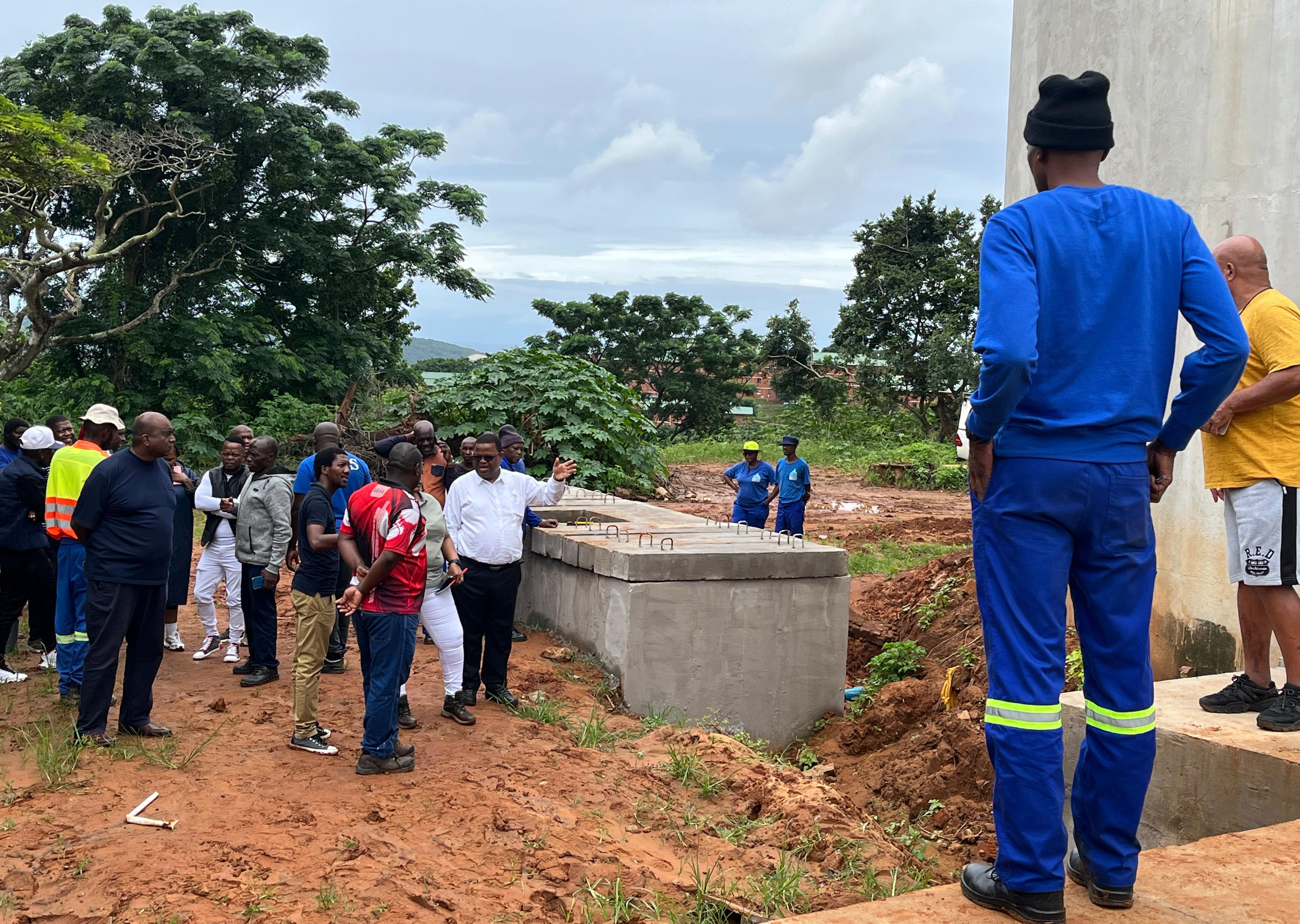Durban residents should brace themselves for further, steady throttling of their tap water supplies over the next few months after government officials signalled growing frustration with the City’s failure to reduce massive water losses.
A previous government plan to reduce treated water supplies to the city by 8.4% of normal daily volumes was due to come into effect in October 2023, but following a series of talks and formal appeals by eThekwini officials, the full implementation of the plan was pushed back by the uMngeni-uThukela Water utility group.
Now it has come to light that the City has only managed to reduce its consumption by about 15% of the original reduction target – and uMngeni-uThukela has reiterated its commitment to implement the full eThekwini “curtailment scheme” over the coming months.
Presenting the utility’s latest annual report in Durban on 13 February, officials noted that eThekwini is the company’s largest single customer, consuming the lion’s share of the province’s treated water supplies.
Following concerns by the national Department of Water and Sanitation (DWS) about soaring rates of leakage and non-revenue water, uMngeni-uThukela was instructed in 2023 to reduce water supplies to eThekwini since the utility was drawing more water from dams than is permitted by its water licence.
According to the annual report, the utility then “assisted” the Durban and Pietermaritzburg municipalities to develop action plans to reduce their water demand over six months from October 2023 to April 2024.
“The action plan also indicated that, should any of the municipalities fail to reduce their planned demand within six months, uMngeni-uThukela Water will have to curtail water supply at the water treatment plants to force compliance with the licence limits.”
Whereas the Msunduzi Municipality had “done well” in reducing its demand, eThekwini’s demand “is still well above their planned reduced demand” due to procurement reasons.
eThekwini had submitted a motivation to DWS to extend the initial six-month grace period so it could finalise procurement and implement water demand interventions, and DWS therefore granted eThekwini an extension up to October 2024 to reduce demand.
Eventually, in September 2024, eThewkini mayor Cyril Xaba announced that a year-long water rationing plan would come into effect from October, although no details were provided on how it would work to ensure equitable rationing in all areas.
Now it has emerged that Durban has continued to draw more than its permitted daily water allocation and is nowhere near the 8.4% daily water reduction target.
According to uMngeni-uThukela chief operations officer Sanele Mazibuko, Durban should have reduced abstraction by more than 100 ML/day, but was not currently meeting this target.
In response to questions from Daily Maverick, he confirmed that the city had only achieved a reduction of about 15% of the overall (8.4%) ration target, partly because the curtailment measures had been suspended during the recent Christmas holiday season and a heatwave in January.
He expressed the hope that the curtailment scheme would be fully in place by September, suggesting that water supplies to millions of Durban residents will tighten steadily over the next few months.
 A government water conservation slogan. (Source: uMngeni-uThukela Water annual report)
A government water conservation slogan. (Source: uMngeni-uThukela Water annual report)
Several parts of the city – notably the Tongaat area – have already had reduced water volumes over recent months, with the Prince Mshiyeni Memorial Hospital in Umlazi also running out of water last week.
In 2023, eThekwini’s “non-revenue water” losses stood at a staggering 56% (compared with less than 33% 10 years ago). This figure refers to water revenue lost owing to a variety of causes, including leaking reticulation pipes, non-payment, theft and metering errors.
In a presentation to the City’s executive committee on 11 February, Xaba acknowledged the sharp increase in non-water revenue in Durban over the past few years and said the City would have to “rapidly step (up) our measures” to reduce physical water losses.
He confirmed that uMngeni-uThukela Water and city officials met last July, when eThekwini was urged to adopt a two-pronged strategy:
- Detecting and fixing water leaks; and
- Reducing average consumption per household.
Xaba said a recent water balance report showed that about 10% of losses were due to illegal consumption and inaccurate water metering, while nearly 40% was due to real water losses from leaks.
“Between the period 2017 and 2023, I have observed sharp contradictions, namely that our consumer sales volumes have been decreasing even when there has been an increase in both service connections and system input volume to our water supply systems… This explains that there are serious leakages in our system, debunking a false narrative that there is an increase in water demand,” he asserted.
Read more: Water Shortages
“Our scientists must guide us correctly. Yes, we must apply stricter water conservation and water demand management measures to dampen the uptake, but we need to rapidly step (up) our measures to combat pure water losses.”
Xaba had asked the city manager to present a Water and Sanitation Turnaround Strategy Business Plan “in the near future”. It should focus on finding and fixing leaks; metering all informal settlements, standpipes and bulk meters for rural areas “so that the City can account for every kilolitre”.
The plan should also include metering nearly 100,000 currently unmetered properties; replacing dysfunctional domestic/commercial/industrial meters that had outlived their value; and ensuring that the City had sufficient meters in stock. DM




 A government water conservation slogan. (Source: uMngeni-uThukela Water annual report)
A government water conservation slogan. (Source: uMngeni-uThukela Water annual report)